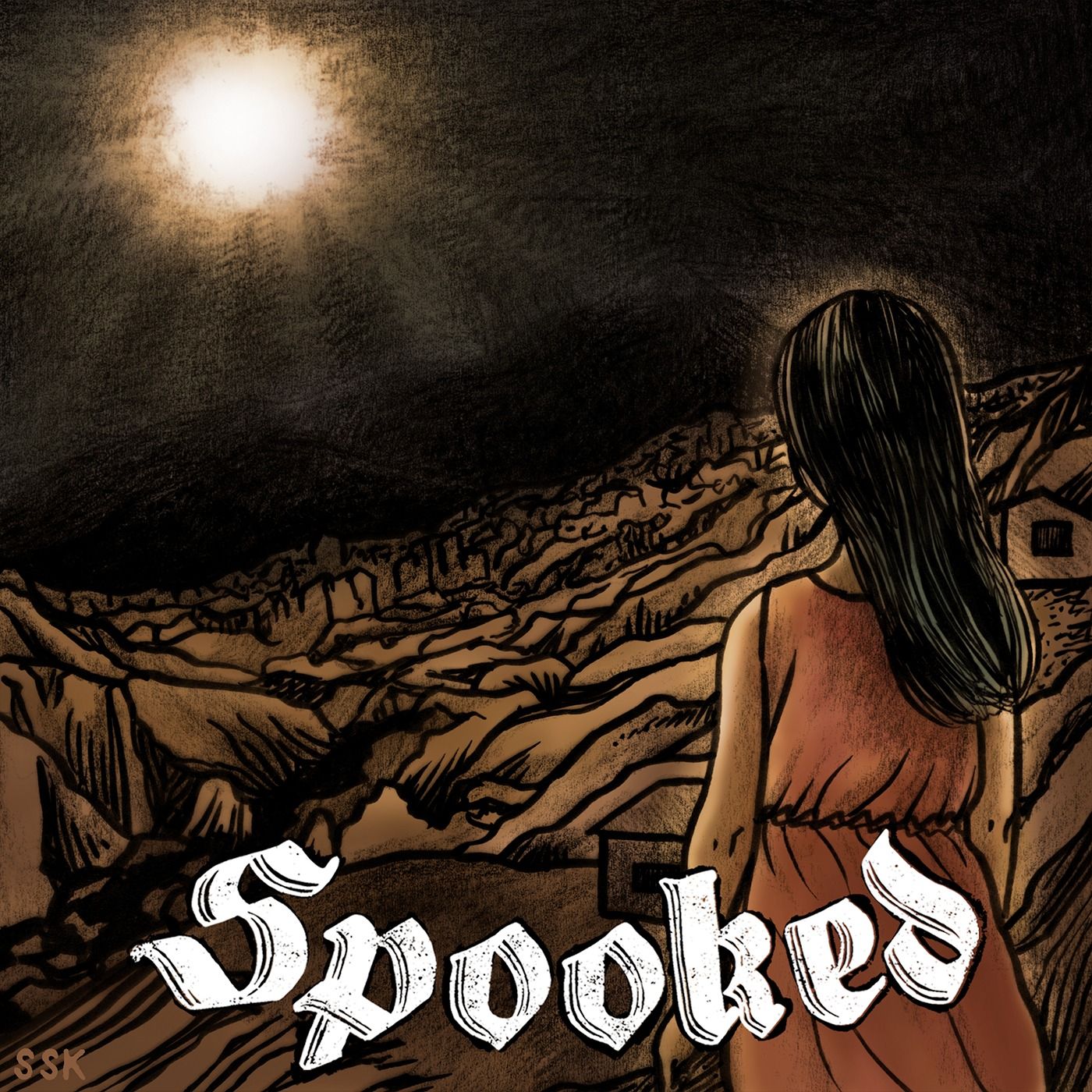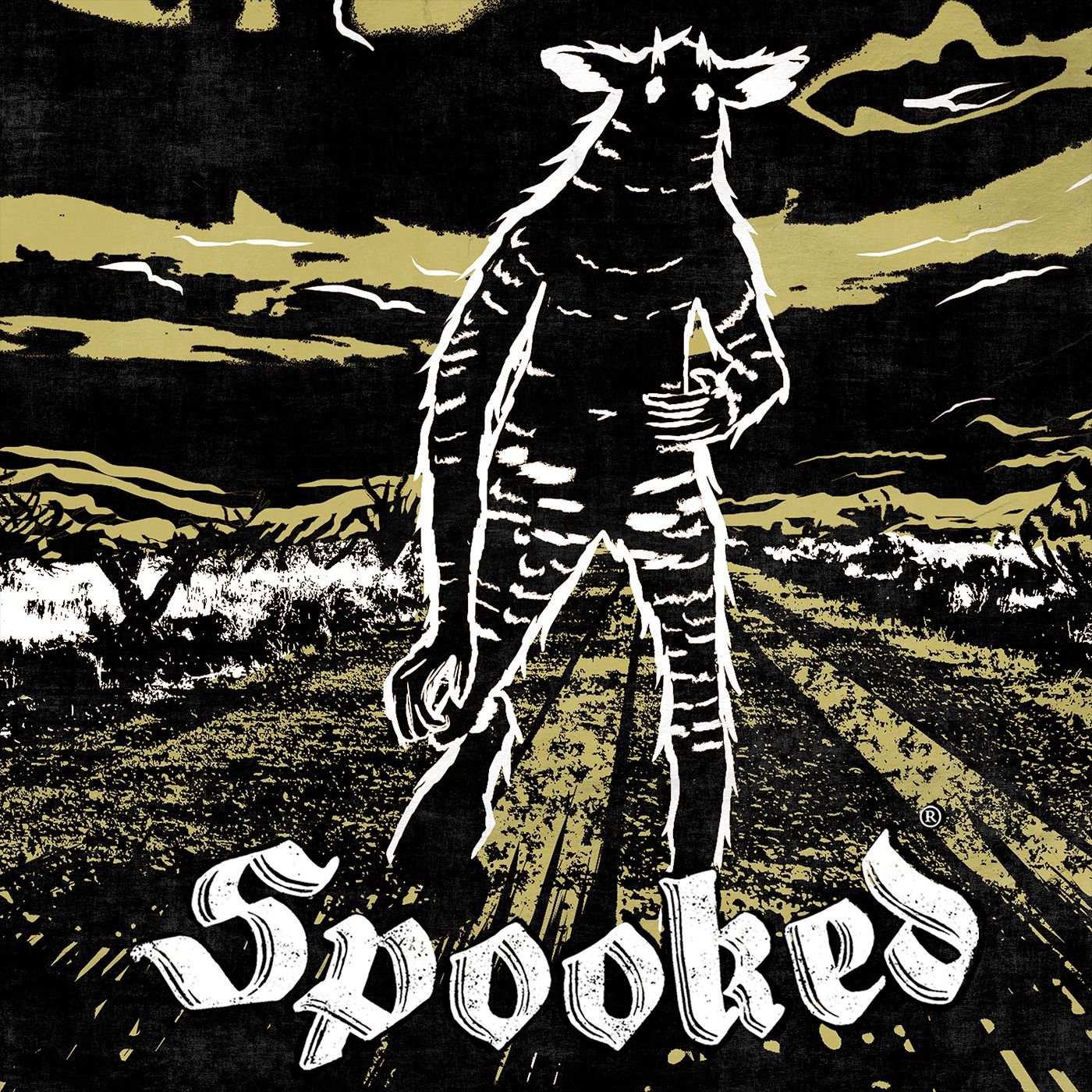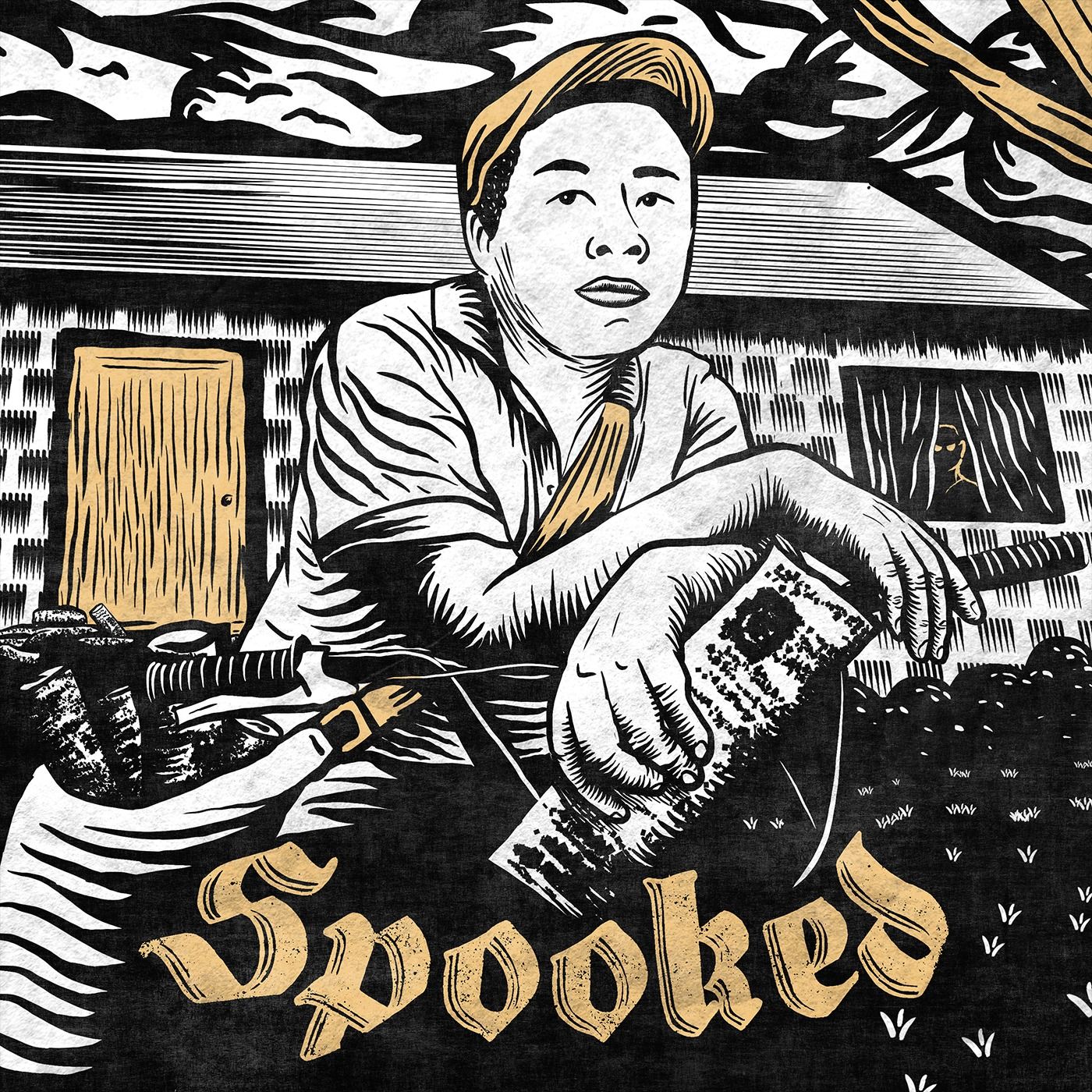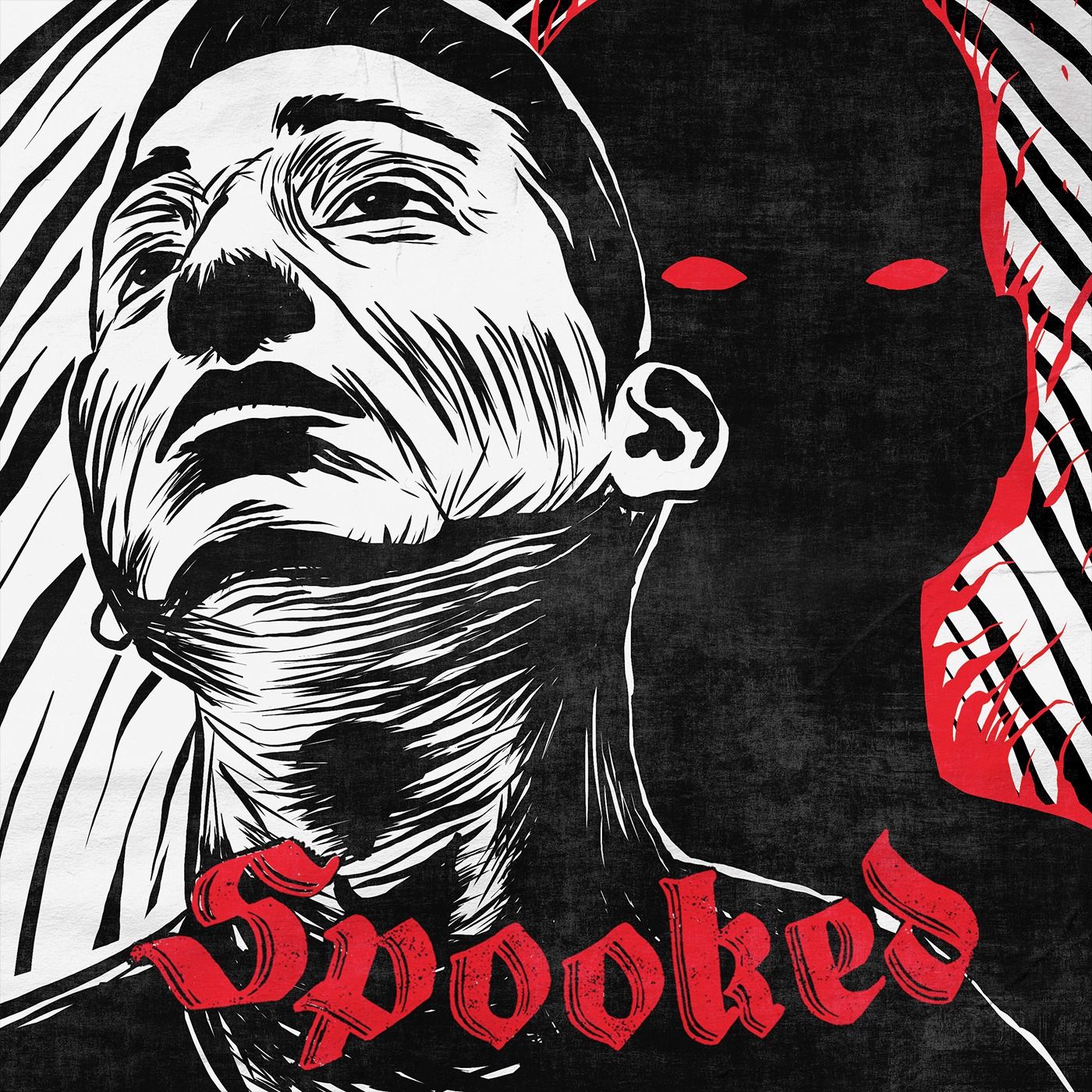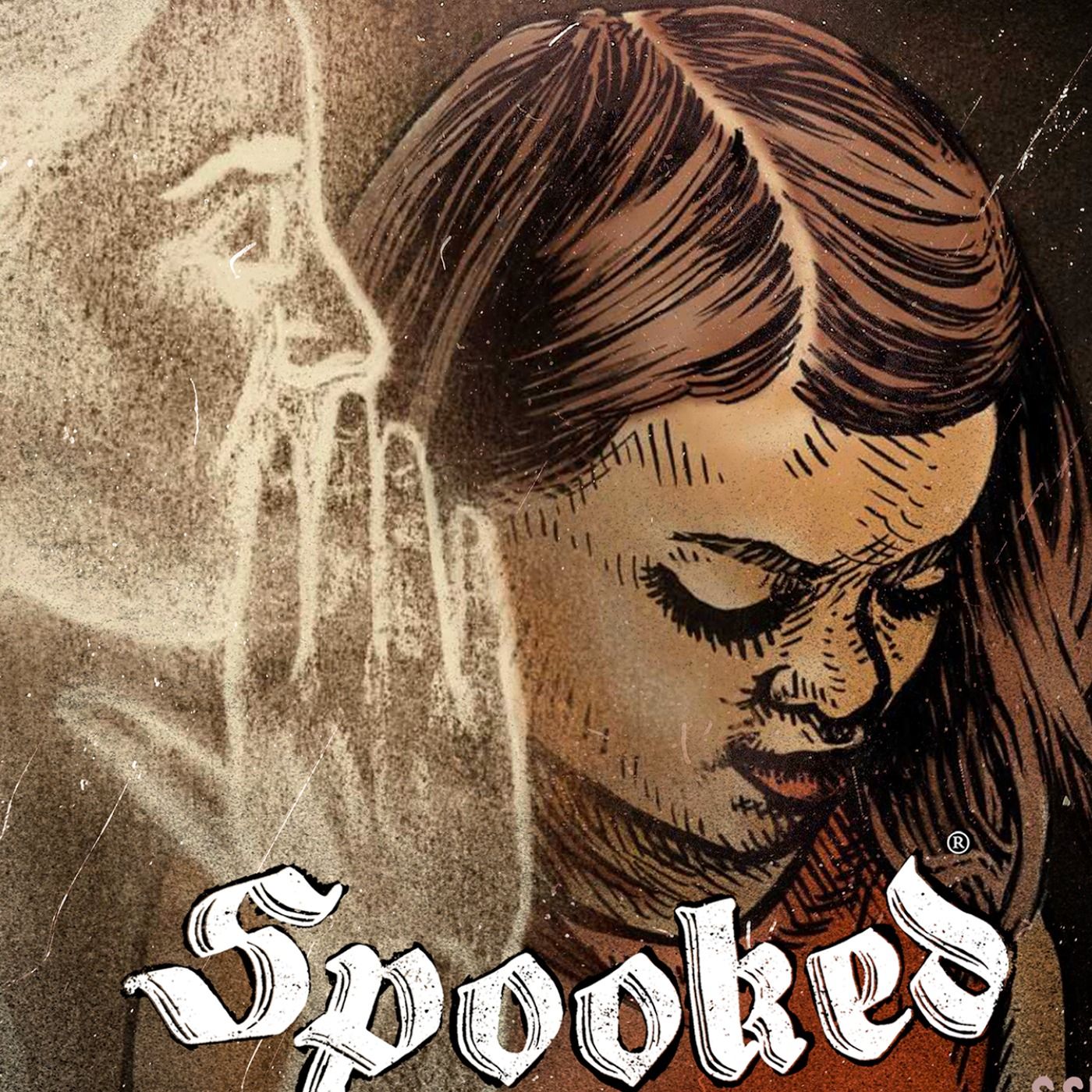Florence in the Machine Pt. 1
Press play and read along
Transcript
Speaker 1 If I should die before I wake,
Speaker 1 I pray the Lord my soul will take.
Speaker 1 But
Speaker 1 if I wake,
Speaker 1 then I must feed.
Speaker 1 I pray he sends me all I need.
Speaker 1 You're listening to Spooked.
Speaker 1 Stay tuned.
Speaker 1 I get to the hospital emergency ward, run through the side door, I tell the lady at the desk the code name, exactly as someone told it to me not 32 minutes prior.
Speaker 1 She types it in,
Speaker 1 types it in again,
Speaker 1
then straightens herself up, officious, stern, tells me, I'm sorry. That is not a valid code.
I cannot grant you admittance.
Speaker 1 I look at her.
Speaker 1 I say very deliberately,
Speaker 1 that is the code someone just recited to me.
Speaker 1 Whatever it is that you're doing, this is not the time.
Speaker 1 Please tell me the room number, the floor, and how to get there right now.
Speaker 1 Another woman, older, walks up behind the first, gently presses her to the side, nods at me,
Speaker 1 clicks a few keys, then hands me a badge.
Speaker 1
The elevator is right there, she says, pointing. Get off on the third floor.
A nurse will call you in.
Speaker 1 I get off on the third floor. And
Speaker 1
it's a family reception type of area. The worst reception area of all time.
Garish hospital carpet, rows of linked plastic metal chairs lined up against the walls. This sad box of children's toys.
Speaker 1 A few other people sit in some of the chairs.
Speaker 1 None of us look at each other.
Speaker 1 We look
Speaker 1 nowhere.
Speaker 1 We all of us, we look down,
Speaker 1 waiting.
Speaker 1 Waiting.
Speaker 1 Then
Speaker 1 I hear these screeching peals
Speaker 1 of laughter.
Speaker 1 A little boy, maybe two years old, the girl, three, and they're digging through the box of toys, delighted, shrieking.
Speaker 1 The boy pulling a half-deflated soccer ball from the junk, the girl swinging some sort of paddle. They squeal in each other's faces.
Speaker 1 Then fat little hands rush back to reach into the bottom of the box again, grabbing, shouting, giggling. Their laughter cuts the gloom like a blade.
Speaker 1 For a moment, all of us drink in the sound
Speaker 1 and it feels as if these walls, this air, this place, the unseen, it feels like we are all the lost and the living. All of us were thirsty together listening.
Speaker 1 A respite,
Speaker 1 embracing the echo of their laughter, inhaling the scent of their joy.
Speaker 1 Then a figure appears in the door.
Speaker 1 The woman glances at her clipboard, looks at my badge,
Speaker 1 and she says,
Speaker 1 Please follow me.
Speaker 1 My name is Tim Washington,
Speaker 1 Spookstar.
Speaker 1 Now.
Speaker 1 Now,
Speaker 1 Jane Boresti. Jane works as a nurse in the ICU wing of a major hospital.
Speaker 1 She sees all kinds of things go down in the ICU, but one night, Jane has a new patient, and that new patient changes everything.
Speaker 1 I'm gonna let Jane take it from here.
Speaker 1 Spoot.
Speaker 2 She had come to us from a nursing home. She was probably 85
Speaker 2 and
Speaker 2 she was having a lot of problems.
Speaker 2
Her heart was bad, kidneys were bad, liver was failing. She was not going to last for very long.
But I had just gone in and done something with her. And as I was leaving, she
Speaker 2 very clearly asked me she said honey do those windows open and I said oh yeah I said you want me to open a window you hot and she said no no I just want you to open it and let the angel in
Speaker 2 and
Speaker 2 I thought
Speaker 2 what is she talking about so of course I look look at the window and there's nothing there
Speaker 2 It's dark out because I was working a night shift at the time.
Speaker 2 And I said, what angel? And she said, well, that angel that's at the window. Don't you see her? She said, she's floating there and she's knocking on the window and she wants to come in.
Speaker 2 I went to the window and opened it and looked out, feeling a little silly to do so because obviously we're on the seventh floor. There's nothing there.
Speaker 2
And looked around and turned and said, no, there's nothing there. There really isn't.
And she said, no, no, it's okay. Said, you've opened the window.
She's come in now.
Speaker 2 So I'm a little freaked out. And looking around the room, don't see anything, and just decide that she was
Speaker 2
this was her period of confusion. In the evening, she got more confused than she did during the day.
So I closed the window and just tucked her in and made sure that she didn't need anything.
Speaker 2 But she seemed very, very
Speaker 2 happy and comfortable now that I had opened the window and let whatever she had seen seen in.
Speaker 2 I leave the room and I go and I speak to one of the older nurses and I mention this strange thing that's just happened to me and she is all nervous and she said, you didn't open the window, did you?
Speaker 2 And I said, yes. I said, I went to look and see what she would, if I could see what she was looking at.
Speaker 2 And she said, oh, she said, you've done it now. She said, she's not going to make it through till morning.
Speaker 2
And I couldn't believe that. I said, what are you talking about? I said, there was nothing there.
This is all in her imagination. She's just confused.
And she said, no, she isn't.
Speaker 2 She said, she saw something and you've let it in.
Speaker 2 She said, so now, she said, get ready. She said, she's not going to make it through till you finish your shift.
Speaker 2 And sure enough, she was right. Three hours later, my patient was gone.
Speaker 2 She had died quietly in her bed and of course I felt guilty because
Speaker 2 in a strange superstitious way I thought that I had somehow caused her death by letting whatever it was that she had seen in which you know I
Speaker 2 I'm not a superstitious person and I trained in the sciences and in facts and so superstition and and magic doesn't really come into it.
Speaker 2 But after seeing all the things that I've seen,
Speaker 2 it's difficult to say that there's not more out there than what we were taught in school.
Speaker 2 At that point, I started talking to other nurses and asked them if they had ever had a patient that had said this to them. And all of them told me the same thing, that it was very common.
Speaker 2 And that all of them had experienced it and they learned very early in their careers that you don't open the window.
Speaker 2 So, my next patient that this happened to, I remember he was a man.
Speaker 2 He had had several heart attacks and again, elderly in his late 70s, I believe. I walk in his room
Speaker 2 and he's in bed.
Speaker 2 He
Speaker 2 is looking into the corner of his room where there's an empty chair.
Speaker 2 He tells me that there's a man sitting in the chair, all dressed in black, who has been talking to him for the past 15 minutes or so and is insisting that he go with him.
Speaker 2
I look to the chair and of course there's nothing there. I don't see anything.
There's just an empty chair in the corner. And
Speaker 2 I
Speaker 2 sit down and I ask him what, not in that chair, of course, but I ask him, do you want to go with him?
Speaker 2 And he thought about it for a moment and said, no,
Speaker 2
I really don't think I want to right now. Said, maybe later, but I'm tired at the moment and I just want to sleep.
I don't think I want to go with him.
Speaker 2 So I told him, I said, well, then don't.
Speaker 2 I said, you tell him quite firmly, I said, you need to be very strong with him and tell him that you're not interested in leaving with him right now, that he needs to go
Speaker 2 and maybe come back another time, but right now, he just needs to leave you alone because you're not ready to go with him.
Speaker 2 We talked for a while and he agreed that he would do that after I left.
Speaker 2
And I can tell you, after I left, I was worried. I kept peeking in on him about probably every 30 minutes or so to see if he was still alive, if he was still there.
And
Speaker 2 he was. He didn't die on me that night.
Speaker 2 I went in afterwards and asked him if he had spoken to the man. And he told me that he did, that he did exactly what I said.
Speaker 2 That he told him that he wasn't ready to go and he wasn't going with him, and that was it. And to leave him alone and let him take a nap.
Speaker 2 And when he woke up from the nap, the man was gone.
Speaker 2
So the rational part of my mind is still saying, you know, they're just imagining this. It's just confusion due to their illness, due to their medication, due to whatever.
They're just confused.
Speaker 2 And that's what they're seeing, even though I had been told by many,
Speaker 2 many veteran nurses that this was real, that they had seen this many, many times, and to take it seriously and not just dismiss the patients when they said that. But
Speaker 2 I was more concerned about losing my patients than I was about the angel in the window. That worried me much more.
Speaker 2 I was taking care of a very, very sweet little old lady. So the first time I met Maddie, I walked in her room, you know, introduced myself.
Speaker 2
Hi, my name is Jane. I'm going to be your nurse tonight.
And I'm going to be taking care of you from now until about seven o'clock tomorrow morning. So we're going to get to spend the night together.
Speaker 2 I
Speaker 2
took out my pen light, looked in her eyes, checked her reaction of her pupils, listened to her heart, listened to her lungs. Everything sounded fine.
At that moment, we got an emergency.
Speaker 2
Somebody came to the door and said, we're getting an admission and we're going to need help. You know, the ETA is five minutes.
According to the paramedics, he was doing pretty poorly.
Speaker 2 So they were bringing him straight to us,
Speaker 2 bypassing the emergency room and coming straight to us.
Speaker 2 Of course, I quickly finished up with Maddie, finished up my assessment. I said, so we need to,
Speaker 2 if you need anything, I said, tell me now because I'm going to be busy for at least a couple of hours.
Speaker 2
And she said, no, she was fine. She didn't need anything.
And she was just going to watch some TV.
Speaker 2 So I left the room, closed the door, go to help out.
Speaker 2 The patient's being brought in by the paramedics on a stretcher. We were surprised at how young he was because most of our patients were in their 70s and 80s and even 90s.
Speaker 2 So to have someone in their 40s is unusual.
Speaker 2 He was pale,
Speaker 2 sweaty,
Speaker 2 holding his chest, saying that he was having a lot of pain.
Speaker 2 And we hooked him up to the monitor. We started giving him medication right away, putting in an IV.
Speaker 2 And it didn't take very long, probably half an hour.
Speaker 2 And
Speaker 2 at that point,
Speaker 2 his heart attack, instead of getting better, got worse.
Speaker 2 We worked on him
Speaker 2 for at least half an hour trying to stabilize him unsuccessfully
Speaker 2
until he finally coded, meaning his heart stopped. And then we tried to resuscitate him.
It's not like on TV. They do CPR for five minutes and then they give up and they stop.
Speaker 2 In real life, you go on for 45 minutes, 50, an hour.
Speaker 2 I've done up to an hour and a half. You do a lot more than than what you see on television so
Speaker 2 we we did everything we could for him and he was only 40 years old and it wasn't enough unfortunately it wasn't enough
Speaker 2 you have to put a smile on and and just keep going and
Speaker 2 sort of separate yourself from any emotions you feel. But
Speaker 2 after we lost that patient, I went and run into Maddie and
Speaker 2
with a smile on my face, and I apologized to her for the long delay. I said, I'm really sorry.
I said, we had an emergency and I just couldn't get back to you. And she said, no, no, it's all right.
Speaker 2 She said, it's just really sad. She said, you know,
Speaker 2 that man dying.
Speaker 2 And I stopped and I said, what man dying? And she said, well, you know, the young man dying that you all were working on across the hall.
Speaker 2
And her door was closed. There was no way she could know anything about the patient that we had been working on across the hall.
She never saw him.
Speaker 2 So I asked her, I said, how do you know about this man across the hall?
Speaker 2 And she said, well, I saw him. She said, when he died, he walked through my room
Speaker 2 and went out in the corner.
Speaker 2 So I was a little,
Speaker 2 this was new for me. I mean, I had seen the angels in the window and things like this, but never
Speaker 2
a dead person walking through the room. So I, and she was completely calm, very, very calm.
And I asked her, I said, so can you describe this person to me?
Speaker 2
She told me he was about six feet tall, which he was. She said that he looked young.
He looked about 35 or 40. And he had been.
He was 40.
Speaker 2 And she told me he had sandy brown hair and blue eyes.
Speaker 2 It was exactly the man that had just died.
Speaker 2 She described him perfectly, and there's no way she could possibly have known this.
Speaker 2 So I was fascinated and a little, more than a little nervous. So I asked her, I said, so...
Speaker 2 How is it you've seen this man? And she was very matter of fact. And she says, well, I've always seen dead people.
Speaker 2 She said, since I was a little girl,
Speaker 2 said, my mother and my grandmother told me that I was born with a second sight and this was normal for her.
Speaker 2 And they never bothered her. She didn't have any problems with it.
Speaker 2 Of course,
Speaker 2 I didn't know whether to believe her or not. It was
Speaker 2 something that was very unusual. So I left the room and I go and I talk to
Speaker 2 other nurses that work there and I asked them, I said, have you ever heard of anything like this? And none of them had. They had all had the same experience that I had with, you know,
Speaker 2
with people coming and trying to take our patients. But never someone, never a patient who could see the dead.
That was news to us.
Speaker 2 In the ICU, we did vital signs every hour, on the hour, round the clock. for everyone.
Speaker 2 And so I think I just went in to check her blood pressure and pulse and things like that, just regular vital signs. I said, the young man from yesterday, I said, did he speak to you?
Speaker 2 And she said that he didn't, but he did look at her and she noticed the confused look on his face. And she told him that everything was going to be okay and he could just keep going.
Speaker 2 And she sort of indicated towards the wall that he could just go through the corner and everything was going to be all right.
Speaker 2 She said he didn't answer her and ended up disappearing through the wall.
Speaker 2 Sometimes she had to reassure them. After that, she took a nap.
Speaker 2 And then when she woke up, I just went in and checked on her again.
Speaker 2 And that was when she told me that a couple hours earlier, she had seen a woman walk through her room.
Speaker 2 I told her, I said, but no one's died in the ICU today. I said,
Speaker 2 how do you have someone who's come through here?
Speaker 2 And she said, No, no, she says, I see dead people from all over. She said, It's not just going to be from here.
Speaker 2 Anyone near me, she said, who passes,
Speaker 2 I get to see them. She says, and I see their spirit.
Speaker 2 And she pointed to the corner of her room and told me, She said, They come through here
Speaker 2 and then they go through the corner and disappear.
Speaker 2 And I asked her, I said, do you speak to them when they come through? She said, sometimes. She said, but there's so many, I can't really talk to them all the time.
Speaker 2 She says, sometimes they want to speak to me. She says, sometimes they want to say things,
Speaker 2 but
Speaker 2 not all the time. And I asked her, I said, so tell me about the one that you've seen today.
Speaker 2 And she told me, she said, she was a woman in her 50s. She had long red hair.
Speaker 2 And she said, she just walked in, went through, she looked me straight in the eye. She said she had blue eyes.
Speaker 2 She said, and then she sort of smiled.
Speaker 2 and then turned and walked through the wall in the corner and disappeared.
Speaker 2 She
Speaker 2 believed she was clutching her chest when she walked through, but she said she got a sense that she had breast cancer and that's what had killed her and she had died of that.
Speaker 2
I said, but you didn't ask her about that. She said, no, she says, but sometimes I can sense what they die of.
She says, I just get a feeling and I know what it is that's killed them.
Speaker 2 At that point,
Speaker 2 I got chills. I have to say,
Speaker 2 I felt the hairs on my arms raise up and I looked around and I thought, this is crazy. How is this possible?
Speaker 2 But I had no proof at that point that anything like that had happened. So I was hoping that maybe she was confused, maybe she was disoriented.
Speaker 2 You know, we were giving her pain medication and that tends to confuse, especially older people, a lot.
Speaker 2 But I thought I have to get to the bottom of this. So I walked out of the room
Speaker 2 and picked up the phone and called the nursing supervisor.
Speaker 2 Nursing supervisors in hospitals, they attend all code blues, they attend all deaths, and they know everything that's going on in the hospital at all times.
Speaker 2 They know who comes in and who goes out, whether they're discharged or whether they die. So I simply called her and I asked her if there had been any deaths anywhere in the hospital.
Speaker 2 Of course, she was curious as to why I wanted to know.
Speaker 2 And I told her the truth. I said, we have a patient who sees ghosts, and she has claimed that someone has died within the last two hours in the hospital.
Speaker 2 And she's seen her spirit walking through her room. And we're just, I just want to double check and find out if that's true.
Speaker 2 And she said, yes, there actually is.
Speaker 2 And then she told me about this lady in oncology.
Speaker 2
She was 52 years old and she had just died a couple of hours ago. And I told her, I said, but I didn't hear a code called.
And she said, no, she was a DNR. Do not resuscitate.
Speaker 2
Simply because she was end-stage breast cancer, she told me, and stage four breast cancer, and there was no saving her. So she had decided to just...
let nature take its course and die on her own.
Speaker 2 So the last thing I asked her I said were you there I said she said yeah of course she said they called me after the death I said did you see her I said what does she look like
Speaker 2 and she told me that she was a redhead in her 50s
Speaker 2 that was
Speaker 2 quite a turning point because now I couldn't just say well she got lucky if you could call it lucky when she talked to me about the young man who had died the day before this was too on the nose this was too perfect
Speaker 2 for the two weeks that she was there
Speaker 2 from time to time whenever she said that she had seen someone we would pick up the phone, we'd page the nursing supervisor and she would call us and we would say okay we have another dead body question and she would just laugh and say
Speaker 2 well who is she seeing now we'd say well you tell us and then we'll tell you if she if her description was accurate and it was every time she was right
Speaker 2 every every patient that died she saw them
Speaker 2 i i don't know how she did it i i really don't know but that's how it was and as i said the nursing supervisor was totally fine with that because after you've been doing this for a while you've seen it all.
Speaker 2 One night I was with her and I spoke to her and I said, Maddie, I said, you're not seeing any dead people right now, are you? And she said, well, she says, actually, my sister came by
Speaker 2 about two hours ago.
Speaker 2
Is your sister dead? I said. She said, oh, yeah, she died about 10 years ago.
I said, so what did she want?
Speaker 2 She said, well, she wants me to go with her.
Speaker 2
I said, Maddie, you're not going, are you? She says, no, no. She says, she came and she tried to convince me.
She tried to talk me into going with her.
Speaker 2 She said, but I told her that it was raining outside and I wasn't going to, about to go out and get wet and get my hair wet. So I wasn't ready to go with her yet.
Speaker 2 And maybe to come back another time when it wasn't raining.
Speaker 2 Now, Maddie was in a room in the corner of the hospital. The blinds were drawn and
Speaker 2 the curtains were pulled.
Speaker 2 Now, it was raining out but there was no way she could have known that it wasn't raining hard enough so that you could hear the rain patterning on the window but there's no possible way that she could have known that it was raining and yet somehow she knew and she told me that it was because her sister was came in and it was all wet and that's how she knew it was raining and she wasn't about to go with her in the rain
Speaker 2
So I encouraged her not to go. I said, well, you know, I said, if you don't want to go out in the rain with your sister, I said, then don't go.
And she said, no, no worries.
Speaker 2 She says, I'm going to stay here for a while. She says, I'm not ready to go with her yet.
Speaker 2 And so I was relieved on one hand, but still nervous for the rest of the night with her, just in case she changed her mind or it stopped raining and she decided to go with her.
Speaker 2 She stayed with us, luckily.
Speaker 2 What I never knew, and I did speak to her and ask her about this, was
Speaker 2 did did they always come through room number four in the open heart ICU? I mean, was that, we used to joke that that was the, that was the stairway to heaven.
Speaker 2 But, or were they drawn to her? And I asked her, I said, do you know? Do you, are they coming through here because this is just the path that they always go when they die?
Speaker 2 Or is it because of you that they're drawn to you because they know that you can see them?
Speaker 2
And she didn't know. She couldn't tell me.
But I have to say, even after she was discharged, all of us were a little wary every time we walked in that room and we looked in the corner.
Speaker 2 We always wondered if there was anyone passing through that we couldn't see.
Speaker 2 And maybe there was.
Speaker 2 I think after her, it
Speaker 2 it brought it home even more that there's more out there than we might know.
Speaker 2 And sometimes
Speaker 2 you just need to suspend your disbelief and
Speaker 2 just take a leap and believe in what you can't see.
Speaker 1 Oh no.
Speaker 1
It ain't over. You know it is not over.
I can't wait for you to hear what Jane does next. We've got so much more on our next episode from Jane.
Get ready. Hold yourself together.
Speaker 1 The score for that storyless by Renzo Corio is produced by Annie Nguyen.
Speaker 1
Waiting. Waiting.
Part two of this very story as you contemplate. Ask yourself, do you know someone that has senses, abilities, powers that don't make logical sense?
Speaker 1 Do they know things they shouldn't know? Do they see things they shouldn't see? And do their abilities change the course of events in your world?
Speaker 1
If so, I need to know know right away. Send me your story, spooked, at snapjudgment.org, because there is nothing better than a spook story from a spook listener.
Spooked at snapjudgment.org.
Speaker 1 And if you want to look good while listening to spook,
Speaker 1 there's only one way to get down.
Speaker 1
Spook gear. Show the world you know the mystery.
Head on over to snapjudgment.org slash shop. That's snapjudgment.org slash shop.
Speaker 1 And if you like your storytelling when the sun is still in the sky, subscribe to the amazing Snap Judgment podcast because it might just change your life.
Speaker 1 Spooks brought to us by the team that will accept any offer of sanctified, purified, or holy water from any religion except a creed. Except the course of Mark Ristage from Mark,
Speaker 1 it burns.
Speaker 1 And assessment, our chief spooksters Eliza Smith, Chris Hambrick, Amy Nguyen, Lauren Newsome, Leon Morimoto, Renzo Gorio,
Speaker 1 Teo DeCot, Marissa Dodge, Aaliyah Yates, Zoe Frigno, Greta Weber, Jacob Winnick, Son of Khan, Tiffany DeLisa, Ann Ford, Fernando Hernandez, Flo Wiley. The spook theme song is by Pat Machini Miller.
Speaker 1
My name is Lynn Washington. And the Netflixes.
The iPhones, the instant messages, the texts, the TikToks, it's all part of the plan. They're trying to distract you, trying to catch you slipping.
Speaker 1 the forces of darkness must be resisted love thy neighbor help the homeless tip well
Speaker 1 and never
Speaker 1 ever
Speaker 1 never ever never ever never
Speaker 1 turn off
Speaker 1 the lights

